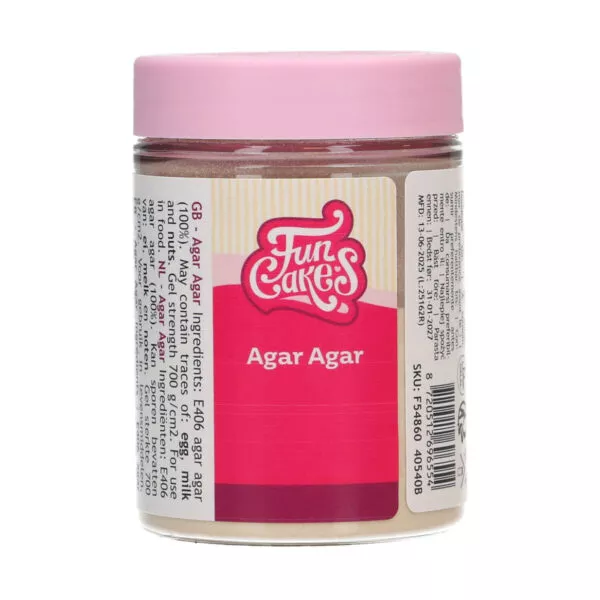
Agar Agar
Agar Agar is a vegetable binding agent that is often used as a vegetarian substitute for gelatin. It is completely odorless and tasteless and you can use it to bind jam, mousse, pudding, fruit desserts, ice cream or soup. Agar Agar binds much stronger than gelatin, so make sure to adjust the recipe accordingly when you replace gelatin for Agar Agar. Read more about this at the bottom of this page.
Agar Agar
agar agar.
May contain traces of: egg, milk, celery.
Store in a cool, dry place, 8-20°C.
Nährwerte pro 100 g
| Energie | 720 kJ / 172 kcal |
| Fett | 0,1 g |
| davon gesättigte Fettsäuren | 0 g |
| Kohlenhydrate | 0,4 g |
| davon Zucker | 0 g |
| Eiweiß | 0,1 g |
| Salz | 0 g |
- 50 g (F54860)
Dissolve the powder in a boiling liquid, for example water, milk or cream. Use about 8 g powder with 1 liter of liquid.
Do you use milk to dissolve the Agar Agar? Then we recommend to always keep your dish in the refrigerator.
Once the powder has completely dissolved, add the mixture to your dish.
Agar Agar already binds at room temperature, so you don’t have to let your dish stiffen in the fridge. Keep in mind that Agar Agar loses its binding power after 2 days, so don’t make your dish too far in advance.
Binding power
FunCakes Agar Agar has a gel strength of min. 700 g/cm3 (based on Nikan / 1.5% 20°C). The binding power is 4-5 times higher than of gelatin. So adjust your recipe accordingly if you replace the gelatin in a recipe for agar agar. We recommend using 8 g of agar agar powder on 1 liter of boiling liquid (water, milk, cream).
Solidify
Agar Agar solidifies at room temperature, so your dish does not have to stiffen in the refrigerator and in warm weather it will last longer outside the refrigerator than when using gelatin. Do you use agar agar in dairy products? Then keep your dish in the fridge. After about 2 days, agar agar loses its binding power. So don’t make your dish too far in advance.



